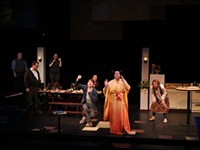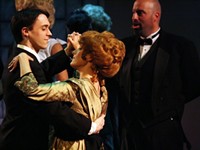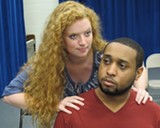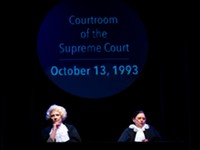[
{
"name": "500x250 Ad",
"insertPoint": "5",
"component": "15667920",
"parentWrapperClass": "",
"requiredCountToDisplay": "1"
}
]
The passage of time can be a horrifying concept, especially when nothing changes. Last weekend marked the one year anniversary of the killing of Michael Brown, which was followed by more of the same, to the collective disgust of some and the collective shrug of too many. America's unfulfilled responsibility to black America includes acknowledging its contribution as a wellspring of creative expression, and the dismissal of black expression is perhaps never more readily practiced by the privileged than when it involves the uncomfortable factor of rage. This week, a small project will bring two one-act plays focusing on the black experience to an alt space stage in the interest of facilitating discussion about facing race.
"When the word 'race' comes up, it's like a suitcase with an anvil in it," says Mark Allan Davis, a Rochester native who currently works as assistant professor of directing and choreography at Ohio University. Davis is directing Amiri Baraka's "Dutchman," one of the two plays. The accompanying play is "Dearborn Heights," by Cassandra Medley, directed by Jerry Argetsinger, associate professor in the department of cultural and creative studies at NTID.
"Dutchman," written in 1964, is about an encounter between a white woman and a black man on a train. Minding his own business, Clay is hesitantly flattered by Lula's flirtatious chatter, which progresses steadily to a sickening level of viciousness. Her behavior threatens him in every important way, yet he is punished for his reaction to being backed into a corner. The work reflects the profound disconnect between what we think we understand of the other, and the horrifically commonplace outcome of that divide.
Davis and Argetsinger have collaborated on bringing big ideas to small stages before. The decision to run these plays began with Davis's idea to stage "Dutchman."
"This last year since Mike Brown was shot August 9, I've been watching, like everyone else, and I had a very tough year," Davis says. "I'm tired in so many ways. I saw what happened when they burned down the CVS in Baltimore, and heard all of these people saying, 'Those people don't care.' I was incensed. It's not that they don't care, its ... what do they own? They didn't show all of the people standing in front of the small businesses, linked arm-in-arm."
"Dutchman" is ultimately about taking a close, hard look at the other perspective. "It's a short show, 45 minutes or so, but it's so important," Argetsinger says. "It's 50 years old, and often credited with starting the Black Literary Movement, and it's still relevant, and still shocking."
Argetsinger's responsibility was to come up with an appropriate companion piece. He ultimately chose Cassandra Medley's "Dearborn Heights," which was written in 1991, but isn't performed often. In the story, two black women meet for lunch in a suburb of Detroit. One is from the South and lighter-skinned than her Northern friend.
The former mistakes the initial hospitality she experiences as confirmation that the North is less racist than the South. When her darker friend arrives at the table, service cuts off, and the two feel a shift in the tone of the restaurant. What follows is a charged conflict that challenges the new friendship.
While "Dutchman" tackles racism, "Dearborn Heights" approaches the issue of intra-racism. The outcome is "cathartic, because they can't change what's around them, but they can change their relationship to each other," Davis says.
The two shows work together, in a time when the political situation in the United States has erupted relating to race again, Argetsinger says. "It's become very relevant, and artists deal with social issues through their art, try to touch the heart, and change the audience."
Stories can help expand our access, in a strangely intimate way, to a whole world of experiences that are not our own. Author Ta-Nehisi Coates says that racism isn't necessarily showing some evil act toward a group people, Davis says. "It is showing a favorable response to one group while displaying skepticism toward another."
"You see it in the culture, you see it in these shootings," Davis says. "You see it in that little 14-year-old girl in McKinney, Texas, getting thrown down by her braids. She'll never be the same. Ever. She'll never look at a white man and have any respect for him. And she'll be traumatized for the rest of her life. It's done."
In many ways, America's lack of cross-racial compassion has gotten worse. "Donald Trump is Archie Bunker," Davis says. "He used to be a comic character on TV. Now he's running for presidential office."
Exerting the effort to trust, to bear witness to what someone has to say about their own experience — even if it's not something you can personally relate to — is the spirit in which these plays are being performed. "Because when you deny them that opportunity, you are blocking yourself off from empathy," Davis says.
Speaking of...
-

Theater review: NTID/RIT's "Tribes"
Feb 5, 2016 -

"A Little Night Music"
Jun 25, 2014 - More »
Latest in Theater
More by Rebecca Rafferty
-

Beyond folklore
Apr 4, 2024 -

Partnership perks: Public Provisions @ Flour City Bread
Feb 24, 2024 -

Raison d’Art
Feb 19, 2024 - More »





